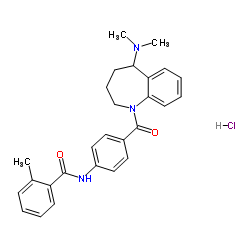| Description |
Mozavaptan hydrochloride (OPC-31260 hydrochloride) is a benzazepine derivative and a potent, selective, competitive and orally active vasopressin V2 receptor antagonist with an IC50 of 14 nM. Mozavaptan hydrochloride shows ~85-fold selectivity for V2 receptor over V1 receptor (IC50 of 1.2 μM), and can antagonize the antidiuretic action of arginine vasopressin (AVP) in vivo. Mozavaptan hydrochloride has the potential for hyponatremia, syndrome of inappropriate antidiuretic hormone (SIADH), and congestive heart failure treatment[1][2].
|
| Related Catalog |
|
| Target |
IC50: 14 nM (Vasopressin V2 receptor); 1.2 μM (Vasopressin V1 receptor)[1]
|
| In Vitro |
Mozavaptan (OPC-31260) inhibits AVP binding to binding to rat liver (V1 receptor) and kidney (V2 receptor) plasma membranes in a competitive manner and that it is about 100 times more selective for V2 receptors. Kd value for [3H]-AVP in rat liver is 1.1 nM; in rat kidney is 1.38 nM. The Kd of [3H]-AVP is reduced significantly in both rat liver and kidney in the presence of Mozavaptan (Kd of 2.47 nM and 5.51 nM for V1 receptor at the doses of 0.3 μM and 1 μM.respectively; Kd of 2.4 nM and 4.03 nM for V2 receptor at the doses of 0.3 μM and 1 μM.respectively)[1].
|
| In Vivo |
Mozavaptan (OPC-31260; 1-30 mg/kg; oral administration; hydrated conscious rats) treatment dose-dependently increases urine flow and decreased urine osmolality[1]. Mozavaptan (OPC-31260; 10-100 μg/kg; intravenous injection; male Sprague-Dawley rats) treatment inhibits the antidiuretic action of exogenously administered arginine vasopressin (AVP) in water-loaded, alcohol-anaesthetized rats in a dose-dependent manner[1]. Animal Model: Hydrated conscious rats (300-350 g)[1] Dosage: 1 mg/kg, 3 mg/kg, 10 mg/kg, 30 mg/kg Administration: Oral administration Result: Dose-dependently increased urine flow and decreased urine osmolality.
|
| References |
[1]. Yamamura Y, et al. Characterization of a novel aquaretic agent, OPC-31260, as an orally effective, nonpeptide vasopressin V2 receptor antagonist. Br J Pharmacol. 1992 Apr;105(4):787-91. [2]. Yamaguchi K, et al. Clinical implication of the antidiuretic hormone (ADH) receptor antagonist mozavaptan hydrochloride in patients with ectopic ADH syndrome. Jpn J Clin Oncol. 2011 Jan;41(1):148-52.
|

